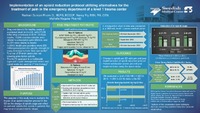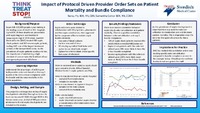| dc.contributor.author | Humiston, Lauren | en |
| dc.contributor.author | Duncan, Rachael | en |
| dc.contributor.author | Fry, Nancy J. | en |
| dc.date.accessioned | 2017-12-04T21:27:16Z | |
| dc.date.available | 2017-12-04T21:27:16Z | |
| dc.date.issued | 2017-12-04 | |
| dc.identifier.uri | http://hdl.handle.net/10755/623666 | en |
| dc.description | <p>ENA 2017: Education, Networking, Advocacy. Held at America's Center Convention Center, St. Louis, Missouri</p> | en |
| dc.description.abstract | <p><strong>Purpose:</strong> Medication reconciliation should be performed at all transitions of care according to the Institute for Healthcare Improvement and AHRQ Patient Safety Network. A recent systematic review on errors in medication history at admission estimated that 54-67% of all admitted patients have at least one discrepancy between the medication history obtained by the admitting clinicians and the actual preadmission regimen and that, in 27-59% of those cases, such discrepancies have the potential to cause harm. This project aimed to assess the accuracy of a newly implemented pharmacy-driven admission medication reconciliation service based in the ED.</p>
<p><strong>Design:</strong> This was a quality assurance project done to assess the accuracy of medication histories enterered into the EHR on patients being admitted from the ED. Prior to implementation of the pharmacy pilot, nursing staff completed medication histories. The pilot put certified pharmacy technicians in the ED, working to capture medication histories on patients being admitted. Technicians were overseen by the ED Pharmacist, who checked all medication lists for accuracy and follow-up.</p>
<p><strong>Setting:</strong> This quality assurance study was completed in the emergency department at an urban level 1 trauma center.</p>
<p><strong>Participants/Subjects:</strong> All ED staff participated in this project. Pharmacy technicians and ED pharmacists were assessed for the quality assurance project.</p>
<p><strong>Methods:</strong> A randomly selected group of 50 patients being admitted from the ED was assessed over a one week period prior to implementation of the pharmacy pilot. Medication histories were collected and recorded in the EHR by nursing staff. Upon completion a pharmacist conducted an independent medication history on each patient and then compared the results for accuracy. During the pilot, medication histories were collected and recorded in the EHR by pharmacy technicians and pharmacists. An identical assessment of accuracy was performed with technicians completing the medication list and a pharmacist checking. <br />The number of total inaccuracies on the medication list were totaled for each patient studied. Inaccuracies were further defined as an omitted, incomplete, and incorrect medication. High-alert medications (defined via the ISMP definition) were identified and assessed for accuracy.</p>
<p><strong>Results/Outcomes:</strong> Results of the assessment showed that 19% of the medication histories completed by ED nursing staff pre-pilot were accurate. 33 of the 50 patients studied were taking at least one high-alert medication (opioids, anticoagulants, insulin and oral hypoglycemics, antineoplastics) identified as inaccurate. When the same assessment was completed on another 50 patients completed by the pharmacy staff overall accuracy increased by over 80%. There were no inaccuracies in this group associated with high-alert medications. Physician and nursing satisfaction were measured both pre- and post-pilot, finding a significant increase in both following the implementation of the pilot.</p>
<p><strong>Implications:</strong> Medication reconciliation completed upon admission from the ED is most accurately completed by pharmacy rather than nursing staff. This is likely due to the many high-level tasks and charting that nurses must complete and an inability to focus dedicated time and energy to the medication list. Pharmacy technicians and pharmacists located in the ED are in a prime position to see that an accurate admission medication reconciliation is completed in a timely manner.</p> | en |
| dc.format | Text-based Document | en |
| dc.language.iso | en | en |
| dc.subject | Medication Reconciliation | en |
| dc.subject | Quality Assurance | en |
| dc.subject | Emergency Department | en |
| dc.title | Medication reconciliation completed by pharmacy on admission from the ED | en |
| dc.type | Poster | en |
| dc.rights.holder | <p>
All rights reserved by the author(s) and/or publisher(s) listed in this item record unless relinquished in whole or part by a rights notation or a Creative Commons License present in this item record.
</p><p>
All permission requests should be directed accordingly and not to the Sigma Repository.
</p><p>
All submitting authors or publishers have affirmed that when using material in their work where they do not own copyright, they have obtained permission of the copyright holder prior to submission and the rights holder has been acknowledged as necessary.
</p> | en |
| dc.description.note | <p>Items submitted to a conference/event were evaluated/peer-reviewed at the time of abstract submission to the event. No other peer-review was provided prior to submission to the Henderson Repository, unless otherwise noted.</p> | en |
| dc.type.category | Full-text | en |
| dc.evidence.level | N/A | en |
| dc.research.approach | N/A | en |
| dc.contributor.department | Non-member | en |
| dc.author.details | Lauren Humiston, BSN, RN, CEN; Rachael Duncan, PhramD, BCPS, BCCP; Nancy Fry, BSN, RN | en |
| dc.conference.name | Emergency Nursing 2017 | en |
| dc.conference.host | Emergency Nurses Association | en |
| dc.conference.location | St. Louis, Missouri, USA | en |
| dc.date.conferenceyear | 2017 | |
| dc.description.reviewtype | Abstract Review Only: Reviewed by Event Host | en |
| dc.description.acquisition | Proxy-submission | en |





